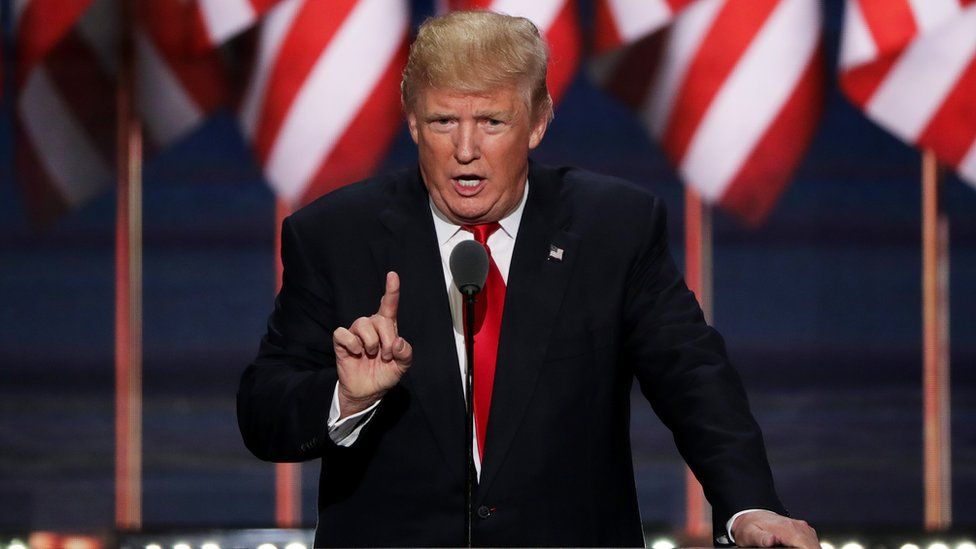How Donald Trump uses American anxiety
- Published

Donald Trump says the US is in a "moment of crisis" and he is the only one who can fix it. How do voters respond to fear?
In his speech accepting the Republican party nomination for president, billionaire Donald Trump painted a grim picture of life in the US.
"The attacks on our police, and the terrorism in our cities, threaten our very way of life," he said. "Beginning on January 20th, 2017, safety will be restored."
The implication is that average Americans are not safe, and Trump cited law-flouting undocumented immigrants, police shootings and homicide rates as evidence of this.
However, many of his statistics were quickly debunked by multiple media outlets or at least shown to be misleading. Though the number of homicides has climbed in several major American cities, the overall crime rate in the US is still at historic lows after falling precipitously in the 1990s. US unemployment is at about 5.5%, down from a peak of 10% during the economic recession.
But Newt Gingrich, one of Trump's allies, said stats don't matter as much as feelings "The average American does not think crimes is down; does not think they are safer," Gingrich told CNN. "Liberals have a whole set of statistics that theoretically may be right, but that's not where people are. People are frightened."
But there are clear reasons why depicting America as a scary, impoverished place is good for Trump.
Shana Gadarian, author of Anxious Politics and an associate professor of political science at Syracuse University, says that when people are anxious, they use "issue ownership" as a proxy for expertise. "Republicans are seen as better on issues of immigration, terror and crime. That's why he's trying to make people anxious about it."
The tendency for people to overestimate how imminently threatening things are is hardly confined to politics, says Emily Thorson, assistant professor of political science at Boston College.
"People aren't very good at estimating risk," she says. "People are much more afraid of Ebola than things that will actually kill them, like alcoholism. Things are perceived as riskier when they're more vivid."
Voters can be motivated by good storytelling. Thorson points to the fact that instead of providing statistics on the number of violent crimes committed by undocumented immigrants, Trump cited the single example of Sarah Root, who was killed by a drunk driver. The man was in the country illegally.
"He's just telling stories, very specific stories, and hoping people use those stories to estimate facts," she says.
But Brendan Nyhan, professor in the department of government at Dartmouth College, says that expecting the average voter to walk around with a head full of statistics is unreasonable.
"I'm sympathetic to people who don't know the facts, I think they're being let down by the media and politicians," he says. "I don't expect people to follow the latest crime statistics.
"People are drawing what are unfortunately reasonable inferences from the information they're hearing and seeing which unfortunately exaggerates the prevalence of crime and crime statistics."
Scholars say the problem is created by journalists as well as politicians.
"Journalism is set up not to say, 'Here's some boring statistics,'" says Thorson. "Events are people getting shot. It's not another person dying of alcoholism or cancer.
"I don't think journalists are malicious, but they're not giving people that [accurate] base rate."
However, stoking fears does not pay out limitless political dividends. Gadarian says that when she read Trump's speech she thought it was "pretty light" on policy solutions, and her research suggests that could be a problem for the candidate.
In one of her experiments, Gadarian had people watch a political ad designed to make them more anxious about illegal immigration. Then they read statements from six fictitious politicians, and Gadarian found that the politicians who spoke only about how scary the situation was were seen as less trustworthy as the ones who also proposed a solution to the problem.
"You need to provide them some solutions for people to trust you more," she says. "People will start to tune out the anxiety after a while if you do not tell them what to do with it."